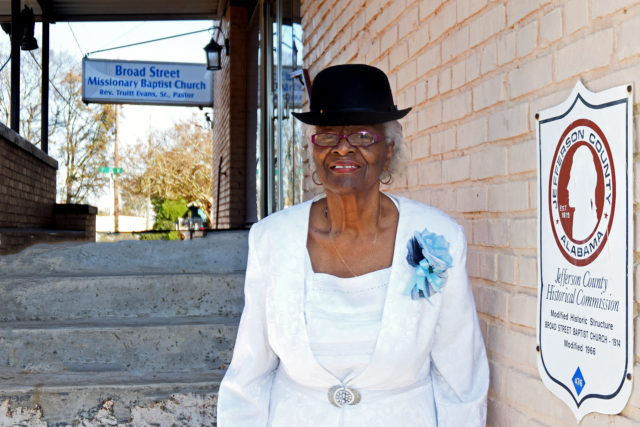
By Solomon Crenshaw Jr.
For the Birmingham Times
A quiet dignity is noticed every time Elmore Quarles reads the history of her place of worship, Broad Street Missionary Baptist Church, located in what is now Birmingham’s Smithfield neighborhood. Quarles assumed the role of church historian decades ago, when the prior historian was unable to serve because of her health.
“After Mary White got sick and got to where she couldn’t read it, she asked me if I would take it,” said Quarles. “That’s how I came to have it. Whatever goes on, I just add it to the history.”
The 141-year-old Broad Street, at 121 Morris Avenue North, where Rev. Truitt Evans Sr. is pastor, is among the oldest churches in Jefferson County. Beyond its age, Broad Street can claim part of the history of the county that celebrates its 200th year this month.
“All things have a beginning, and so it was with Broad Street Missionary Baptist Church,” Quarles read at the church’s homecoming celebration last month. “There is no official written record of eventful history of the church. All memories come from older members.
“With no money to build a church, a man by the name of Mr. Felix Mudd—a white man—gave a small frame house to some people who worked for him.”
The church history lists Mr. Felix Hawkins, Mr. John Umbles, Mr. M. Mayfield, Mrs. Anna Bradford, and Mrs. Lou Brown as the persons to whom the house was donated. The Mudd family name is also prominent in the history of the church and Jefferson County.
Quarles continued reading, “In 1878, the Spring Street Baptist Church was organized and was located where the Elyton School now stands. In 1906, Elyton Elementary School was built on the lot adjoining the church.”
Arlington Historic House, which sits a few blocks west of the old Elyton School site, was built in the first permanent Jefferson County seat—the small town of Elyton, named in honor of Connecticut federal land agent William Ely, who came to the area to inspect some property on behalf of a Hartford, Conn., school for the hearing impaired and donated part of the land for the Elyton courthouse. The site was previously called Frog Level and was known primarily as a sporting grounds for horse races.
The Jefferson County Courthouse, which had been located in Elyton, burned down, and land to build Broad Street was donated by the Elyton Land Co.; bricks from the courthouse were donated to build the church.
“In 1909, the church was moved to its present location and renamed the Broad Street Missionary Baptist Church,” Quarles read.
The Broad Street history chronicles the growth and development of the church, including the installation of indoor restrooms, building of a fellowship hall, and the addition of an educational wing.
Quarles, who declined to give her age but acknowledged being with the church for the past 63 years, couldn’t say from memory how many pastors the church has had. The Rev. Solomon Crenshaw Sr., who passed away in October 2009, was its longest tenured leader.
“He was there for 49 years,” Quarles said, “just a few months from being 50.”
Historical Markers
Broad Street is among the structures in Jefferson County to have a marker from the Jefferson County Historical Commission, created in 1971. The marker program was established a few years later.
“Initially, markers were offered to some of the more famous buildings in the city, some of the original churches, and some of the big commercial buildings,” said Linda Nelson, executive secretary of the historical commission. “When they started accepting applications, they set the criteria as being National Register criteria, which is 50 years old and [focuses] on the structures, not their significance historically but just to acknowledge the built history of the county.”
The historical commission set two categories for its markers. There are historic sites, which are locales like cemeteries and places where things happened but there is no visible structure. The other category is for buildings, where most of the markers can be found.
For a while, the commission color-coded its markers for the West, East, and North parts of the city, but it abandoned that system, as it became laborious.
“I have just written the letter for marker number 1,766,” Nelson said. “Add about 1,000 more to that number, and that’s probably how many markers are out there.”
As Elmore Quarles has added events to the history of Broad Street since she accepted the role of historian, the final passage she reads remains the same.
“With a backward glance and a forward look on this day, for the most glorious chapter in the history of Broad Street Missionary Baptist Church has been written,” she reads. “All the documents have been approved. This church is declared an historical site. We can say the Lord has done great things for us, whereof we are glad.”
Solomon Crenshaw Jr. is a deacon at Broad Street Baptist Church and son of its longest-serving pastor, the late Rev. Solomon Crenshaw Sr.
Click here to read more stories about Jefferson County’s bicentennial.



